Thousands march at Minnesota State Capitol to protest abortion, oppose PRO Act
Over 50 pilgrims from the Holy Cross Area Faith Community (New Ulm, Searles, and West Newton Township) received the blessing of Bishop Chad W. Zielinski before departing by bus for the Jan. 22 March for Life in St. Paul. The group was among thousands marched at the State Capitol on the 50th anniversary of Roe v Wade – a 1973 landmark Supreme Court decision that legalized abortion. Elective abortions have been legal in Minnesota since that decision which struck down laws protecting unborn children nationwide. Although the Supreme Court’s 2022 Dobbs v. Jackson ruling now allows states to decide their own abortion laws, the Minnesota Supreme Court’s Doe v. Gomez decision continues to require a policy of abortion-on-demand in Minnesota. The annual March for Life, sponsored by Minnesota Citizens Concerned for Life, took place days after the house approved a bill called the Protect Reproductive Options (PRO) Act seeking to enshrine in Minnesota law the right to abortion, up to the time of birth, with no restrictions. As marchers commemorated the harm done by abortion over the past 50 years, they also petitioned state lawmakers to reject the PRO bill.


Minnesota’s Most Rural Diocese Diocese of New Ulm Vol. 37 No. 4 January/February 2023
(Photo by Christine Clancy)
office of the bishop
That they may have life
Bearers of Good News: Educators of Faith

 by Bishop Chad W. Zielinski
by Bishop Chad W. Zielinski
There is still a sense of loss that lingers with the recent death of Pope Benedict XVI, but great rejoicing for centuries to come as the Church continues to discover anew the many treasures he left in his teachings that invite us to a renewed personal encounter with Christ and a deeper understanding of the Truth.
I draw your attention to an address given by Pope Benedict XVI on April 17, 2008, to a gathering of Catholic educators. The thrust of the Holy Father’s talk was sharing thoughts on the nature and identity of Catholic education today. To those gathered: “‘How beautiful are the footsteps of those who bring good news,’ (Romans 10:15). With these words of Isaiah quoted by Saint Paul, I warmly greet each of you – bearers of wisdom . . . ”
I extend a profound thanks to our Catholic educators serving in our 13 Catholic elementary and three high schools as well as those involved in parish religious education programs throughout the diocese. I also include the primary educators of our children in the faith, the parents. It is they who, before the Christian community, gave God a resounding “yes” at their child’s baptism to raise them in

PTHE r A r IE CATH ol IC
The Prairie Catholic, the official newspaper for the Diocese of New Ulm since May 1972, is published every six weeks, Sept.–June.
Publisher: Bishop Chad W. Zielinski
Editor: Christine E. Clancy
Submission deadline is the 1st of each month prior to publication.
Publication office: Diocesan Pastoral Center, 1421 6th Street North, New Ulm, MN 56073; phone: 507-359-2966, Email: dnu@dnu.org Website: www.dnu.org
Postmaster: Send notice on Form 3579, “The Prairie Catholic,” 1421 6th Street North, New Ulm, MN 56073-2071. Periodical postage paid at New Ulm and additional mailing offices. USPS 926-760.

the practice of the faith. In this sacred promise to God, the parents turn to our Catholic educators in our schools and parishes, inviting them to join in the formation of a Catholic conscience of their children. This formation process involves much preparation, dedication, and sacrifice on behalf of both parents and educators.
Pope Benedict XVI reminds us of the focus of this partnership: “First and foremost, every Catholic educational institution is a place to encounter the living God who in Jesus Christ reveals his transforming love and Truth. This relationship elicits a desire to grow in the knowledge and understanding of Christ and his teaching. In this way, those who meet him are drawn by the very power of the Gospel to lead a new life characterized by all that is beautiful, good, and true; a life of Christian witness nurtured and strengthened within the community of our lord’s disciples, the Church.”
The Holy Father continues by emphasizing that the “dynamic between personal encounter, knowledge, and Christian witness is integral to the diakonia of the truth which the Church exercises in the midst of humanity.”
The ongoing formation of a child’s conscience sharpens their mind with moral clarity as they encounter the revelation of Divine Truth. Sadly these days
the world seems to peddle a package of “personalized truth.” In other words, we each determine our own Truth. This results in moral chaos and confusion. It is completely disconnected from a living, personal encounter with the one, Jesus Christ, who is the fullness of Truth.
Both Catholic and non-Catholic parents enroll their children in our Catholic schools with the full intent that their children encounter the Truth that is different from the confusion of secular society. Some do this through great financial sacrifice. I am always profoundly moved by the personal stories I hear of heroic measures taken by a parent to send their child to a Catholic institution.
Also, it is a reality that our Catholic parishes and schools exist through the extreme generosity of donors. This is what keeps the doors open, the heat on, and a roof over our heads. Most of these donors I know are motivated by an encounter with the Truth, the person of Jesus Christ.
Through this driving passion, they desire that each child, all equal in dignity, to encounter the healing and hopeful presence of Christ. There has been and will always be a tension between divinely revealed Truth and the message blasted throughout our world, especially via the internet and television. As we live in a nation filled with financial abundance,
it seems that we cannot avoid the ever-increasing desire to want more, earn more, and consume more. This stifles the very desire for the beatitude that lives in the core of our being – a desire that true happiness will only be found in a joyful encounter with God. our parishes and schools must be vigilant of this pervasive mindset while encouraging moderation.
The Good News of the Gospel is just that, “good news.” Amidst the clouds of confusion, the Good News will always prevail. We have some extraordinary examples of this in the great legacies of Catholic educators etched in our nation’s history. Pope Benedict, in his talk, brought to the attention of those gathered two very powerful women saints that profoundly impacted Catholic education in America. “Towering figures, like Saint Elizabeth Ann Seton and other founders and foundresses, with great tenacity and foresight, laid the foundations of what is today a remarkable network of parochial schools contributing to the spiritual well-being of the Church and the nation. Some, like Saint Katharine Drexel, devoted their lives to educating those others had neglected – in her case, African Americans and Native Americans.”
Amidst great adversarial forces and against odds that at times seemed to be impossible, these women established institutions that sowed seeds that would bear
abundant fruit in the lives of those whom societies have pushed to the margins. Their witness and sacrifice continue today, and Pope Benedict called it “an apostolate of hope.”
You Catholic educators, along with parents, are “bearers of wisdom and good news,” which is the heart of this apostolate. As ambassadors of hope, the fire of Christ within you allows you to see each child radiate God’s beauty, goodness, and Truth, which in turn helps the child to carry this flame that was ignited in your classroom to their family home no matter how challenging that situation might be. I commend you for your countless sacrifices, never giving up on a child, having hope beyond hope, and taking the torch of faith as a guiding light into the future.
You have my heartfelt support and prayers. Keep the fire of faith burning brightly in the schools and parishes of the Diocese of New Ulm. I echo the parting words of Pope Benedict XVI: “To all of you, I say: bear witness to hope. Nourish your witness with prayer. Account for the hope that characterizes your lives (cf. 1 Pet 3:15) by living the Truth which you propose to your students. Help them to know and love the one you have encountered, whose Truth and goodness you have experienced with joy.”
The Prairie Catholic l Page 2 l January/February 2023
Bishop Zielinski’s November schedule included a visit to St. Peter’s Elementary School in Canby (preschool - grade 6) on Nov. 7, 2022. Pictured with the bishop, back-center, are St. Peter students and Fr. Michael Doyle, parochial vicar of Christ the King AFC (Canby, Ivanhoe, Lake Benton, St. Leo, Tyler, and Wilno). (Photo submitted)
Priestly milestones

The Prairie Catholic congratulates priests of the Diocese of New Ulm who will be celebrating significant priestly anniversaries this year. Thank you all for your many years of priestly service.
diocesan church
Return to the source and summit of our faith in the celebration of the Eucharist
65 Years
35 Years
Rev. Germain Rademacher was ordained Feb. 23, 1958. He retired from activity priestly ministry in 2003.

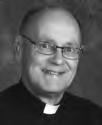
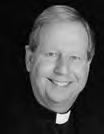
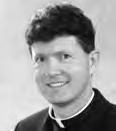
55 Years
Rev. George Schmit was ordained March 10, 1968. He serves as senior associate of Heart of Jesus Area Faith Community (Bird Island, Olivia, and Renville).
50 Years
Rev. David Breu was ordained May 27, 1973. He retired from active priestly ministry in 2017.
40 Years
Rev. Paul Wolf was ordained June 11, 1983. He serves as pastor of the Area Faith Community of St. Anastasia in Hutchinson and St. Boniface in Stewart.
35 Years
Rev. Paul van de Crommert was ordained June 25, 1988. He serves as pastor of Holy Rosary in North Mankato.
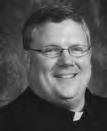
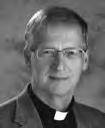
Rev. Mark Mallak was ordained June 25, 1988. He currently provides weekend assistance throughout the diocese and he serves as a chaplain to the Worldwide Marriage Encounter retreats.
30 Years
Rev. Brian Oestreich was ordained May 29, 1993. He serves as pastor of the Spirit of Life Area Faith Community (Ortonville, Rosen, and Madison).
20 Years
Rev. Cornelius Ezeiloaku was ordained Aug. 16, 2003. He serves as parochial vicar of St. Catherine in Redwood Falls and St. Anne in Wabasso.
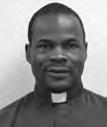
Families First Project
(Continued from page 1.)
standpoint of our staff this session, but we’ll also be encouraging Catholics and giving them the tools on our website to advocate for these bills themselves,” Adkins said.
He noted the Catholic call to faithful citizenship, saying the tools MCC provides are not just advocacy resources, but catechetical tools as well.
“We want to help Catholics understand how Catholic social teaching applies in a variety of contexts,” he said.
Achieving the goals of the Family First initiative will take time. MCC hopes to get the majority of bills for the Families First Project passed by the end of the 2026 legislative session.
Adkins encouraged Catholics to join and rally for the cause. As
On March 27, 2020, Pope Francis presided over Eucharistic Exposition and Benediction at the beginning of the COVID-19 pandemic as he prayed and preached in an empty St. Peter’s Square. He called the world to trust in the Eucharistic presence of the Lord in that time of turbulence and crisis.
The effects of the pandemic and the necessity of refraining from gathering for the Eucharist, as well as the clerical sexual abuse scandal and an alarming number of the faithful who seem to unable to recognize the gift of the real presence of Christ in the Eucharist, spurred the Catholic bishops in the United States to take urgent action and they announced an ambitious plan for a Eucharistic Revival of the faith in our country.
Launched on Corpus Christi Sunday in June of 2022, the revival’s mission is to renew the Church by enkindling a living relationship with our Lord in the Holy Eucharist. With the installation of the Diocese of New Ulm’s new bishop Chad Zielinski in September of that same year, the diocese’s participation in the Eucharistic Revival was given a new and enthusiastic direction. In his installation homily, the bishop identified three points of pastoral vision for the diocese leading
faithful citizens, it’s not just about showing up to vote every couple of years, but about being an “advocate for policies that impact human dignity and the common good,” he said.
“Pick a policy, educate yourself about it and the potential impact; we give you the tools on the website, and then go talk to your legislator,” he said.
This could be done through parish groups, such as a respect life committee or social concerns group. He said the project is “a powerful opportunity to come together and advocate for good legislation.”
Editor’s note: For other issues that the Minnesota Catholic Conference will be monitoring in 2023 visit www.mncatholic.org.
us into the Eucharistic Revival process: “Hear God, hand him our hearts, and have renewed hope in God’s providence.”
The Eucharist is the source and summit of our faith. We must turn to Jesus repeatedly trusting in those three steps, so that the glory of God, through the Word Made Flesh, may speak to us, may penetrate our hearts, and transform us.
Committee formed
To date in the Diocese of New Ulm, a diocesan Eucharistic Revival Committee has been formed. Bishop Zielinski has appointed Deacon Ken Noyes as the coordinator of the diocesan participation in the revival process and Fr. Anthony Stubeda as the priest moderator. Plans are underway by the committee to allow all people and groups to participate in and experience the call to a renewal of their relationship with Christ through the Eucharist. The plans will be revealed on the diocesan website, www.dnu.org, and shared in
Bishop’s calendar
Feb. 11 – Diocesan Council of Catholic Women Mass, St. Aloysius, Olivia
Feb. 11 –Shepherd of Souls AFC Confirmation, St. Philip, Litchfield
Feb. 12 – Jesus Our Living Water AFC Confirmation, St. Mary, Willmar
Feb. 12-14 – Ordination of Bishopelect Patrick Neary, Diocese of St. Cloud
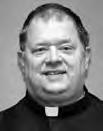
Feb. 14-15 – Diocesan Clergy Days, St. Mary, Willmar
Feb. 15 – Priests Council meeting, St. Mary, Willmar
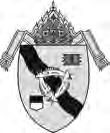
Feb. 15 – College of Consultors meeting, St. Mary, Willmar
Feb. 21 – Diocesan Staff Meeting, Diocesan Pastoral Center, New Ulm
Feb. 21 – Priest Personnel Board meeting, Diocesan Pastoral Center, New Ulm
Feb. 22 – Minnesota Catholic Conference bishop’s meeting
Feb. 25 – Good Teacher AFC Confirmation, St. Eloi, Ghent
Feb. 26 – Rite of Election, Cathedral of the Holy Trinity, New Ulm
Feb. 28 – United for Life, Minnesota State Capitol, St. Paul
March 1 – Vocations team meeting, Diocesan Pastoral Center, New Ulm
March 3 – Diocesan Staff Lenten Morning of Reflection, Diocesan Pastoral Center, New Ulm

March 5 – Bread of Life AFC Confirmation, Holy Redeemer, Marshall
parishes as they are finalized.
Receive the newsletter!
The Heart of the Revival email newsletter will help enkindle, rekindle, and deepen a living relationship with Jesus in the Eucharist. It’s the simplest way to stay connected to what the National Eucharistic Revival is all about: responding to Our Lord’s personal, loving two-fold invitation to remain with him in the Eucharist at Mass and in prayer, and to go out with him on mission for the life of the world.
Sign up to receive weekly emails dynamic reflections, videos, and resources from trusted voices in every corner of the Church. Don’t miss this opportunity to get a glimpse of how this unprecedented national movement is restoring our culture through every trusting “Yes!” we offer to the Holy Spirit.
Sign up today! www.eucharisticrevival.org/ heart-of-the-revival-newsletter.

March 7 – Diocesan staff meeting, Diocesan Pastoral Center, New Ulm
March 8 – Committee on Parishes meeting, St. Aloysius, Olivia
March 10 – Diocesan vocations team meeting, Diocesan Pastoral Center, New Ulm
March 11 – Heart of Jesus AFC Confirmation, St. Mary, Bird Island
March 12 – Divine Mercy AFC confirmation, St. Mary, Sleepy Eye
March 13 – USCCB Committee on Priorities and Plans, Washington, DC
March 14-15 – USCCB Administrative Committee meetings, Washington, DC
Editor’s note: Calendar respresents the bishop’s schedule at the time The Prairie Catholic went to press.
The Prairie Catholic l Page 3 l January/February 2023
por Bishop Chad Zielinski
Todavía hay un sentimiento de pérdida que persiste con la reciente muerte del Papa Benedicto XVI, pero hay un gran regocijo en los siglos venideros a medida que la Iglesia continúa descubriendo los tesoros que dejó en sus dóctrinas ya que nos invitan a un encuentro personal renovado con Cristo y a entender mejor sobre la Verdad.
Pido que pongan atención al discurso por el Papa Benedicto XVI del 17 de abril, 2008, de una reunión de educadores católicos. La idea central de la reunión fue de como hoy compartimos pensamientos sobre la identidad de la educación católica. A los presentes: “Cuán hermosos son los pasos de los que anuncian buenas nuevas (Romanos 10:15). Con estas palabras de Isaías citadas por San Pablo, los saludo cordialmente a cada uno de ustedes, portadores de la sabiduría.
Quisiera expresar mi mas profundo agradecimiento a nuestros educadores católicos que prestan servicios a nuestras 13 escuelas primaria y las tres escuelas secundaria y a todos los que trabajan en el programa de educación religiosa en toda la diócesis. También quiero incluir a los primeros educadores de nuestros hijos en la fe, los padres de familia. Ellos quienes, ante la comunidad cristiana, dieron un “sí” rotundo a Dios en el bautismo de sus hijos para educarlos en la práctica de la fe. En esta promesa sagrada a Dios, los padres de familia van a nuestros educadores católicos de nuestras escuelas y parroquias, para invitarlos a unirse a la formación de la fe católica de sus hijos. Este proceso implica mucha preparación, dedicación y sacrificio tanto por parte de los padres de familia como de los educadores.
El Papa Benedicto XVI nos recuerda sobre el enfoque de esta colaboración: “En primer lugar, y sobre todo, cada institución educativa católica es un lugar para encontrar a Dios vivo, el cual revela en Jesucristo la fuerza transformadora de su amor y su verdad. Esta relación suscita el deseo de crecer en el conocimiento y en la comprensión de Cristo y de su enseñanza. De este modo, quienes lo encuentran se ven impulsados por la fuerza del Evangelio a llevar una nueva vida marcada por todo
diocesan church

Para que tengan vida
lo que es bello, bueno y verdadero; una vida de testimonio cristiano alimentada y fortalecida en la comunidad de los discípulos de Nuestro Señor, la Iglesia.”
El Santo Padre continúa que la “dinámica entre el encuentro personal, conocimiento y testimonio cristiano es parte integral de la diakonía de la verdad que la Iglesia ejerce en medio de la humanidad.”
La formación continua de la conciencia de un niño agudiza su mente con una claridad moral a medida que encuentra la revelación de la Verdad Divina. Cada uno de nosotros determinamos nuestra propia Verdad. Esto resulta en un caos moral y confusión. Está totalmente desconectado de un encuentro vivo y personal con Jesucristo, que es la plenitud de la Verdad.
Tanto los padres católicos como los no católicos registran a sus hijos en nuestras escuelas católicas con la intención plena que ellos encuentren la Verdad que es diferente de la confusión de la sociedad secular. Algunos hacen un gran sacrificio financiero. Siempre me conmueve los testimonios personales, como los padres de familia hacen hasta lo imposible por mandar a sus hijos a una institución católica.
Además, es una realidad que nuestras parroquias y escuelas católicas existan gracias a la extraordinaria generosidad de sus contribuyentes. Esto es lo que mantiene sus puertas abiertas, la calefacción encendida y un techo. La mayoría de sus contribuyentes son motivados por un encuentro con la Verdad, Jesucristo. A través de esta pasión impulsora, desean que cada niño, iguales en dignidad, encuentren la presencia esperanzada y curativa en Cristo.
Siempre hubo y habrá tensión entre la luz de la Verdad revelada y el mensaje que se difunde por todo el mundo, especialmente a través de la Internet y la televisión. Puesto que vivimos en una nación llena de abundancia financiera, parece que no podemos evitar el deseo de querer, ganar y consumir más. Esto sofoca el deseo mismo de la bienaventuranza que vive en el centro de nuestro ser. Un deseo que la verdadera felicidad se encuentra en un encuentro gozoso con Dios solamente. Nuestras parroquias y escuelas deben estar alertas a esta actitud generalizada mientras se fomenta la moderación.
La Buena Nueva del Evangelio
es “buenas nuevas.” En medio de la nube de confusión, las Buenas Nuevas siempre prevalecerán. Aquí algunos ejemplos extraordinarios educadores católicos grabados en la historia de nuestra nación. En su discurso, el Papa Benedicto llamó a los presentes sobre dos santas que impactaron profundamente en la educación católica en los Estados Unidos. “Figuras eminentes como Santa Isabel Ana Seton y otros fundadores y fundadoras, con gran tenacidad y clarividencia, han impulsado la institución de lo que hoy es una considerable red de escuelas parroquiales que contribuyen al bienestar espiritual de la Iglesia y de la nación. Algunos, como Santa Katharine Drexel, dedicó su vida para educar a los ignorados, en su caso, los afroamericanos y Americanos indígenas.”
En medio de una fuerza adversaria y lo que por momentos parecía imposible, estas mujeres establecieron instituciones que sembraron semillas que darían fruto abundante en su vida de una sociedad marginada. Hoy, su testimonio y sacrificio continúa y el Papa Benedicto lo llamó “un apostolado de esperanza.”

Ustedes, los educadores católicos, junto con los padres de familia son “portadores de la sabiduría y de la buena nueva,” un corazón de este apostolado. Ustedes, como embajadores de esperanza, y llevan el fuego de Cristo dentro de ustedes les permite ver a cada niño irradiar la belleza, la bondad y la Verdad de Dios, eso ayuda al niño a llevar esta llama que se encendió en su aula a su casa sin importar cuán difícil sea. Los felicito por los tantos sacrificios, nunca se dan por vencidos en favor de sus hijos, tener esperanza más allá de la esperanza y tomar la antorcha de la fe como una luz de guía hacia el futuro.
Cuente con mi más sincero apoyo y oraciones. Mantenga el fuego de la fe y que brille intensamente en las escuelas y parroquias de la Diócesis de New Ulm. Reitero las palabras de despedida del Papa Benedicto XVI: “A todos ustedes: Dar testimonio de esperanza. Alimentar tu testimonio con la oración. Dar cuenta de la esperanza que caracteriza su vida (cf. 1 P 3,15) al vivir la Verdad que ofrece a sus estudiantes. Ayúdalos a conocer y amar a aquel que han encontrado, cuya Verdad y bondad has experimentado con alegría.”
Bishop-elect Patrick Neary
On Dec. 15, 2022, Pope Francis appointed Fr. Patrick Neary, 59, as bishop-elect of the Diocese of St. Cloud. He has served as the pastor of Holy Redeemer Catholic Church in Portland, Oregon, since 2018. A priest of the Congregation of Holy Cross, he was ordained in 1991. His appointment as the 10th bishop of the Diocese of St. Cloud comes after the pope’s acceptance of Bishop Donald Kettler’s resignation. Kettler, 78, has served as bishop of St. Cloud since 2013. “Fr. Neary is tremendously qualified with his experiences as a pastor, seminary rector, formation director, and missioner,” Kettler said following the announcement.
Bishop-elect Neary will be ordainted and installed as the bishop of St. Cloud on Feb. 14, 2023.
Bishop-elect Michael Izen
On Jan. 5, 2023, Pope Francis named Fr. Michael Izen, a native of Fairmont, Minn., and a priest of the Archdiocese of Saint Paul and Minneapolis, as an auxiliary bishop of the archdiocese, assigning him the titular see of Newport. Bishop-elect Izen, 55, is currently the pastor of the Churches of Saint Michael and Saint Mary in Stillwater, the parochial administrator of the Church of St. Charles in Bayport and the canonical administrator of Saint Croix Catholic School.
As an auxiliary bishop, he will work alongside Archbishop Bernard A. Hebda of Saint Paul and Minneapolis and Auxiliary Bishop Joseph Williams to lead the Church in the 12-county metro area. Archbishop Hebda said: “The priests and faithful of the archdiocese should be honored that once again the Holy Father has chosen a priest of this local Church to serve as a successor of the apostles.” He praised the bishop-elect as “a generous and capable pastor with a great love for Christ and for his sheep.”
Bishop-elect Izen is scheduled to be ordained a bishop on April 11 at the Cathedral of St. Paul.
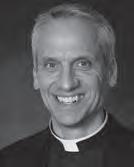
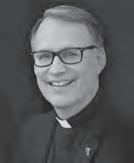
God loves a cheerful giver!
 by Bishop Chad Zielinski
by Bishop Chad Zielinski
Over the past two months, I have been accused of bringing Alaska to Minnesota as I navigate the snowy and icy roads of the diocese, making pastoral visits and celebrating Mass. Like Alaskans, I see that Minnesotans are resilient and make the best of what is at hand. There are loads of snowmobile tracks, and every third pickup is towing a fish house. I very much enjoy being here and see this appointment as a great blessing in my life.
I am amazed at the diversity of businesses and small manufacturing companies scattered amidst the great expanse of farmland in the south-central plains of Minnesota. Hearing the personal stories of more of the faithful, I see a variety of skills and talents shaping the face of the Mystical Body of Christ in the Diocese of New Ulm. This living reality of the riches of talents amidst a people with an unrelenting work ethic overflows with significant generosity.
St. Paul reminds us in 1 Cor 12:4-7, “There are different kinds of spiritual gifts but the same Spirit; there are different forms of service but the same Lord; there are different workings but the same God who produces all of them in everyone. To each individual, the manifestation of the Spirit is given for some benefit.” As the new shepherd of this diocese, I see this scripture alive and well. I offer a huge thanks for keeping an open heart and mind to the movement of the Holy Spirit, urging each one to pour forth their unique talents that are changing our diocese and promoting God’s beauty, goodness, and truth alive in each person.

The Prairie Catholic l Page 4 l January/February 2023
. . ”
Pope Benedict XVI
Late pope remained true to the faith rather than secularized doctrinal
(Continued from page 1.)
Reading the signs of the times at this significant moment, the soon-to-be pope highlighted the multitude of confusing “winds of doctrine” that have arisen in recent decades, ranging from Marxist collectivism to radical individualism. Collectively, these secularized ideas undermine the Gospel truths about humankind’s purpose and eternal destiny that Jesus first proclaimed nearly 2,000 years ago.
“Today, having a clear faith based on the Creed of the Church is often labeled as fundamentalism,” Cardinal Ratzinger pointed out, “whereas relativism, that is, letting oneself be ‘tossed here and there, carried about by every wind of doctrine,’ seems the only attitude that can cope with modern times. We are building a dictatorship of relativism that does not recognize anything as definitive and whose ultimate goal consists solely of one’s own ego and desires.”
At the time of his election, Benedict was particularly concerned about how this thinking had hollowed out the faith of his native European continent, displacing its foundational Christian identity with a rationalistic worldview that allows no place in public life for beliefs that are anchored in religion instead of empirical science. In another address he delivered shortly before becoming pope, he described how this scientific rationalism operates from the premise that its conception of freedom, untethered from “unscientific” religious beliefs, can serve as the fundamental principle for ordering societies.
In practice, though, this untethered rationalist freedom quickly degenerates into prohibitions that deny the free expression of all viewpoints judged to be intolerant or discriminatory by rationalism’s changeable canon of values.
“Very soon it will not be possible to state that homosexuality, as the Catholic Church teaches, is an objective disorder in the structure of human existence,” Cardinal Ratzinger predicted. “And the fact that the Church is convinced of not having the right to confer priestly ordination on women is considered by some up to now as something irreconcilable with the spirit of the European constitution.”
Those who doubt the prescience of these predictions, and the degree to which even the Church itself is being distorted by this relativistic mentality, need only to look at the agenda of dissent now being pressed forward brazenly by the German Synodal Way on these issues – with the full support of most of Germany’s Catholic bishops.
A related error that Benedict repeatedly warned against, most famously in his September 2006 address in Regensburg, is the contemporary intellectual insistence that the truths of religious belief must be separated from the application of reason.
This disconnect of faith from reason degrades human persons from possessing the dignity of beings created in the image of God, reducing them instead to the status of merely material creatures whose needs can be identified and addressed only by secular societies according to a utilitarian morality devoid of any recognition of faith.
Here in the U.S. at this moment relativism’s dictatorial advance, and the separation of faith from reason, can be seen most clearly in the accelerating drive by many American public institutions to impose an ideology of “gender identity.” This destructive ideology falsely claims that a person’s God-given and immutable biological sexual identity is not what defines whether an individual is male or female. Instead, whether an individual is male, female or “gender-fluid” must be defined solely on the basis of an individual’s self-identification with respect to their sexuality. It’s hard to get more “relative,” or less reasoned, than that.
Furthermore, just as Benedict prophetically warned, leading proponents of gender ideology are vehemently dictatorial in their insistence that no one can be allowed to dissent from their perspective.
We are also currently experiencing the harsh realities of the dictatorship of relativism in the wake of the overturning of Roe v. Wade. Pro-abortion ideologues now are insisting that their own belief, that in the name of “freedom of choice” every pregnant woman has the right to abort a baby at any time right up
to birth, is the only viewpoint that individual states can be allowed to express in their abortion laws. The rights of the unborn to remain alive, and the rights of pro-life crisis pregnancy centers to strive to protect their lives, are of no consideration for these relativistic extremists.
They are backed in their extremism by sympathetic proabortion state governments such as California, which in the wake of Roe’s demise has passed a plethora of completely one-sided new pro-abortion laws.
Benedict’s concerns about the West’s dictatorship of relativism, and the abandonment of Christian belief that underlies it, were never directed primarily toward the specific political contexts of issues like abortion and human sexuality, although this political context does provide striking confirmation of the problems he forecasted. Even less, as George Weigel eloquently observed after the pope emeritus’ death, could this kind-hearted and gentle man ever be wedged into a preconceived politicized caricature as a mean-
spirited “conservative” doctrinal inquisitor.
Instead, the pope emeritus remained permanently a man of the Church he loved so deeply, true to its unchanging deposit of Catholic faith rather than the secularized doctrinal and political winds of modernity. His principal objective in considering contemporary ideas and events was always to discern how the Church can engage constructively with today’s prevailing political and cultural dynamics, in order to proclaim anew Christ’s saving message to every man and woman of this time.
And while he foresaw the mistakes of our day with crystalline clarity, he responded to these errors with Christian hope, not with despair. As he reminded his fellow cardinals in his famous pre-conclave homily, the core antidote to every cultural, social and spiritual malaise is always the same: friendship with Jesus Christ.
In contrast to those determined to build the dictatorship of relativism, “We, however, have


a different goal: the Son of God, the true man,” he declared. “He is the measure of true humanism. An ‘adult’ faith is not a faith that follows the trends of fashion and the latest novelty; a mature adult faith is deeply rooted in friendship with Christ. It is this friendship that opens us up to all that is good and gives us a criterion by which to distinguish the true from the false and deceit from truth.”
We pray now that Pope Emeritus Benedict will stand together with his great friend and collaborator John Paul II “in the window of the Father’s house,” to employ Cardinal Ratzinger’s own compelling imagery at the conclusion of his homily at John Paul’s funeral Mass. From these heavenly heights, we hope that in God’s providence this holy tandem of contemporary popes will continue their intercession for the men and women of our time, just as they toiled so courageously on our behalf throughout their long lives of earthly service.
God bless you!
Article courtesy of the National Catholic Register, www.ncregister.
A personnel perspective: Remembering the theologian who eventually became pope
by Fr. Mark Steffl
When I was a seminarian in Rome, before Joseph Ratzinger was elected to replace John Paul II on the Chair of St. Peter, I personally had the opportunity to meet the future pope on Thanksgiving Day in 2005. I remember the specific day because of the American holiday, which is just another European school day. We were free to attend a Mass in Rome instead of the usual early Mass in the seminary chapel.

Cardinal Ratzinger would offer a Mass each Thursday morning in the German College Chapel in the Vatican for German-speaking pilgrims in Rome. A classmate from Dubuque, Iowa, was made aware of this and asked if I wanted to go.
After the Mass, we waited with the hope that we would be able to speak with the cardinal. When he came out of the sacristy, he was very kind and engaging in conversation. I remember starting the conversation in Italian,
and almost immediately, he recognized that we were English speakers, and he spoke with us in very refined English. He asked which dioceses we were from, what universities in Rome we were studying at, and what our specializations in theology were. (At that point, both of us had finished three years of general theology studies, the final two years being an opportunity to specialize in specific areas of theology that the diocesan bishop chooses.)
Those who worked with Cardinal Ratzinger during his 20 years in Rome before his election as pope always testified to his kindness and sincerity. There were many stories of people stopping him on his daily walk to his office of tourists, not knowing who he was, and asking for him to take their photos, which he graciously did. The people he worked with spoke of how he took a personal interest
(Continued on page 8.)
The Prairie Catholic l Page 5 l January/February 2023
As a young seminian studying in Rome, Diocese of New Ulm priest Fr. Mark Steffl is pictured with then, Cardinal Joseph Ratzinger.
29 January - 4 February
Celebrating the work of our local Catholic schools
Testimonials:
By Maria Petersen, parent St. Peter’s School, Canby
My husband, Aaron, and I have chosen a Catholic education for our son at St. Peter’s Catholic School in Canby because we value the strong moral ideals that are integral to a Catholic education as an extension of what we strive to teach at home.




We are extremely blessed that our son is the third generation in our family to attend St. Peter’s Catholic School in Canby. We feel that the daily exposure to
 By Carlos and Shelly Mendiola,
By Carlos and Shelly Mendiola,
Holy Trinity School, Winsted
the Catholic faith lays a solid religious foundation for our son to see how God is present in his life and to ultimately prepare him for living an integrated life beyond the elementary years.
Regular celebration of the Sacraments creates a climate where all students can more easily choose goodness and holiness. One of our weekly highlights is to be able to attend school Mass with our son and see him develop his confidence by taking an active part in the different ministries of the Mass through lectoring, song leading,
parents
We have six children, all of whom attend Catholic schools. Our two oldest are graduates of Holy Trinity School in Winsted, and both are currently attending the University of Mary in Bismarck. Our four other children are attending Holy Trinity School, and our senior is looking to attend either Thomas Aquinas College or Benedictine College in the fall.
or bringing up the gifts. The older kids sit with the younger preschoolers and serve as role models for how to act at Mass.
It is heartwarming to see the outpouring of hugs and the love the children offer to their parents, grandparents, family, and friends following the school Mass.
St. Peter’s School is a safe and caring environment that fosters a community of love and family. The small class sizes truly foster individualized relationships between students and faculty. Our son raves about “Kathy’s lunches,” and he has a special bond with his current teacher, Mrs. Anderson, that sometimes involves some pretty interesting side topics such as peanut butter and jelly and cheese sandwiches
or “blizzard” warnings (which may include paper snowballs). There is never a dull moment!
Commitment to the service of others and faith in action is demonstrated throughout the school year. Our son has experienced the kindness of students and staff of St. Peter’s and participated in sharing this kindness by rallying to support others in time of need through activities such as 100 Hail Marys offered and cards sent during sickness, fundraisers for families experiencing hardships, food items for the food shelf, or visiting the elderly at the local long term care facility.
Knowledge is a gift of the Holy Spirit, and the holistic education



Testimonial: Why I send my kids to Catholic school
 By Dale Bailey, parent New Ulm Area Catholic Schools
By Dale Bailey, parent New Ulm Area Catholic Schools
Why would we send our kids to a Catholic school? How can they compete? I don't understand it. I didn't go to a Catholic school, and I turned out fine. This took some convincing for me.
My name is Dale and I would like to share why I send my kids to a Catholic school.
Let’s go back a few years; quite a few. My kids think I’m old, so I might as well live up to the claim. In 2002 after college, I moved to New Ulm from a small town in western Wisconsin. My first job out of college was working for Del Monte Foods in Sleepy Eye. I’m what the locals might call an “Auslander.”
After a few months, I met my lovely wife, Becky on a hayride. It was great. I grew
up in the country, milking cows for the neighbors, so it is fitting that we met on a bale rack. Today, Becky works outside the home as a physician’s assistant and we also farm with her family. We are blessed and sincerely thankful to raise crops and livestock with help from our kids.
Growing up, Becky and her family all went to New Ulm Area Catholic Schools (NUACS). It set the stage for them. They were involved in band, athletics, plays, and volunteering in the community. Really involved! They made some amazing memories and had opportunities I didn’t get in rural Wisconsin.
Becky and I have four kids. Before our oldest was born, we decided that our kids would attend a Catholic school. We have a strong faith and commitment to the church. And that’s where it all starts, right? We want to raise good kids. Kids that will contribute and have a chance to deepen their faith. Catholic schools set that foundation, and for us, it’s the hands-down
reason why our kids go to NUACS. When you think about Catholic schools, you must also think about the other stuff. Our oldest is an eighth grader at Cathedral High School. Last year, 97% of her class participated in some sort of extracurricular activity. That number is crazy when you think about it. All these kids are becoming young adults, being active, making memories, and getting a chance to explore their talents.
Our three youngest just wrapped up another amazing Christmas program at St. Anthony Elementary School. They read – a lot! They persevere, they grow in virtue and they make friends. They’re little hardcore Catholics. They look forward to school, and they are challenged. Their teachers know them, hold them accountable, and instill a culture of kindness in them.
When you think about Catholic schools, you must consider the foundation and the launchpad. The opportunities; this is
where it all starts. This is your one chance to get it right and to make sure you’re doing everything you can as a parent to set the stage for your child’s growth and contribution.
It’s parents coming together to work on the playground project or put chairs away after the Christmas program. It’s dropping your kid off at a birthday party and knowing the parents are awesome. It is meaningful and calming to be a part of a community unlike any other. Catholic schools bring families together and have made me feel less “Auslander-ish.”
It’s togetherness. It’s family. It’s unique, and it’s Catholic.
Sending our children to a Catholic school was a decision we made long before they were school-aged. It is a continually affirmed decision shown by the fruits we have been privileged to witness. Our Catholic faith is at the heart of our home. In sending our children to school, we desired to send them somewhere that would be an extension of our homelife, a place where Jesus would be talked about and loved every day. A place where truth, goodness, and beauty are revealed. A place that would see our children for whom they were created to be and where their dignity is found in their identity as sons and daughters of God. Our Catholic school, Holy Trinity, is such a place.
Our children have the privilege of participating in daily Mass, frequent reception of the sacraments, and praying in Eucharistic Adoration. After Mass, prayer continues to be woven throughout the day and includes the morning offering, the Angelus at noon, and the St.Michael prayer at the last bell. Our children are learning the disciplines of a classical education, such as grammar, rhetoric, and logic, and reading the Great Books. Most importantly, they are being formed as disciples of Jesus Christ and nurtured by virtue.
We do not send our children to Catholic school to shelter them from the world but rather to give them a respite from a saturated, secular culture that is battling for their souls. When they walk into the world, we believe that with the firm foundation they have received from home and their Catholic education that has helped form their minds and hearts, they will be well-equipped to navigate through life, having a clearer understanding of their very purpose; to know, love, and serve God.
“To all of you I say: bear witness to hope. Nourish your witness with prayer. Account for the hope that characterizes your lives (cf. 1 Pet 3:15) by living the truth which you propose to your students. Help them to know and love the One you have encountered, whose truth and goodness you have experienced with joy.” – April 2008, Pope Benedict’s address, Catholic University of America, Washington, D.C.
provided at St. Peter’s school offers the academic, spiritual, physical, and emotional tools to help foster the love of lifelong learning.
St. Peter’s Catholic School has shown us as parents that it is committed to providing students opportunities to live out the Gospel of Jesus and gain the courage to act on their Catholic beliefs in community, worship, and service. The dedication of the teachers to providing a quality education with a curriculum that emphasizes Catholic values are some of the many reasons we love our Catholic school.
special report The Prairie Catholic l Pages 6-7 l January/February 2023
Catholic Schools Week 2023
St. Mary’s School, Sleepy Eye freshman Natalie Fischer, left, and Reese Hoffmann.
Good Teacher AFC (Ghent and Minneota) parish pastor Fr. Todd Petersen visits with St. Edward Catholic School, Minneota, preschool and kindergarten students.
John Ireland School, St. Peter fifth graders Dominic Yost, left, and Will Weber.
Left-right, St. Edward Catholic School, Minneota students Colton DeRoode (gr. 3), Charlie Myhre (gr. 4), and Sebastian Bothun (gr. 4).
71 years
70 years
69 years
69 years
68 years
John and Delores (Kubesh) Wannigman were married on May 24, 1952. They are members of St. Aloysius, Olivia.
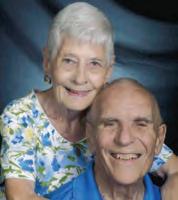
68 years
Bernard and Theresa (Haas) Vonderharr were married on August 31, 1955. They are members of St. Michael, Madison.
Joseph and Rosemary (Doom) Van Keulen were married August 20, 1953. They are members of St. Mary, Tracy.


67 years
William and Mary Lou (Schmitz) Fenske were married June 30, 1956. They are members of the Cathedral of the Holy Trinity, New Ulm.

Frank and Helen (Klein) DeSleer were married June 22, 1954. They are members of Holy Redeemer, Marshall.
67 years
Eugene and Shirley (Walsh) Brandt were married June 9, 1956. They are members of Holy Rosary, North Mankato.


Pope Benedict made significant contributions to teaching and theology
(Continued from page 5.)
in their lives, from the very top of his staff down to the bottom. (Unfortunately, he was often portrayed very differently in the secular media.)
In the spring of 2005, Pope John Paul II died right after Easter. I had the chance to be in St. Peter’s Square when the Conclave elected Cardinal Ratzinger as the new pope. As I waited in the square with thousands of others to see who would be elected to replace Pope John Paul II, I then witnessed the white smoke from the chimney over the Sistine Chapel announcing that a new pope had been chosen.
I had the opportunity to study the theological writings of Joseph Ratzinger (up to that point, at least in 2005) because I wrote my tesina (a sort-of dissertation) on the pedagogy, or style of teaching, that was common in his writing style, most especially as it related to his Christian anthropology which is the concept of the human person from the understanding of Christianity.
In reading and studying the writings of Cardinal Ratzinger, I quickly became aware of how prolific a writer he was. His


style of writing sought to engage the present Western culture, proposing in a very logical way that the teachings of scripture and the tradition of the Church were founded in the Divine Wisdom of God in Creation. He always strove to show that the requirements of the Christian faith are reasonable and that the human person can build an understanding of who they are and what their place in the world is, in relation to other people and the whole of God’s Creation, beginning from the Book of Genesis. In the writings of Joseph Ratzinger, accepting God and his love for us in the form of a personal relationship as his sons and daughters is something that we are all called to do and to help others to discover.
One particular theme that emerged consistently in his writings was the “search for God” and the “search for Truth.” The search for God is, as the newly elected Pope Benedict XVI said, “a God with a face, a human face, a God who reconciles, who overcomes hatred and gives us the power of peace that no one else can give us.”
This search brings us to find a link between heart and head and a faith that unites us with
a God who ultimately loves us and brings our hearts as well as our minds to him, and gives us a deeper understanding then, of who we are, and puts us on the “right road” that leads to eternal life.
One close collaborator who knew and worked with Pope Benedict XVI before and after he was elected pope observed Joseph Ratzinger’s contribution to the Church and theology over his long career before being elected pope, as pope, and since resigning is worthy of the title “doctor of the church.” A “doctor,” in this case meaning “teacher,” from the Latin docere meaning to teach,” is a title that has been given to 37 men and women who have made significant contributions to teaching and theology over the last 2000 years of Church history. Whether or not he is given the title officially in the future, Joseph Ratzinger certainly can be recognized for a remarkable contribution to the Church in his theological writings, service to the Church as a priest, bishop, cardinal, and pope, and his Christian example of searching for the “face of God.”
May he rest in peace.
Don and Myrtle (Griebel) Brand were married June 5, 1954. They are members of the Cathedral of the Holy Trinity, New Ulm.
66 years
Richard and Mary (Scholl) Hanson were married June 22, 1957. They are members of St. Mary, Willmar.

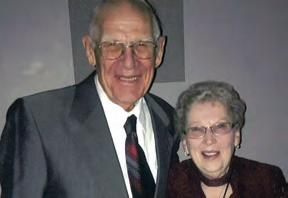

65 years
Jerome and Arlene (Moldan) Tauer were married on August 12, 1958. They are members of St. Michael, Morgan.
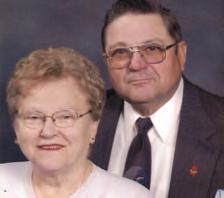


Charles and Sharon (DeZeeuw) Bakker were married June 21, 1955. They are members of St. Dionysius, Tyler.
66 years
James and Carol (Cullen) Kluegel were married on August 6, 1957. They are members of Our Lady of the Lakes, Spicer.
65 years
Etien and Marian (Gawarecki) Laleman were married on September 15, 1958. They are members of St. Edward, Minneota.
Consider attending a Worldwide Marriage Encounter weekend retreat where you will be given tools to remain strong as a couple and learn skills to bring joy and excitement back into your marriage. Visit wwme.org to view a schedule of upcoming Worldwide Marriage Encounter retreats.

The Prairie Catholic l Page 8 l January/February 2023 65th and beyond marriage jubilees
Lent’s ashes, reminder of our humanity as imperfect people in need of salvation
by Fr. Ed Dougherty, M.M. The Christophers
February 22nd is Ash Wednesday – the start of Lent. The ritual of receiving ashes on the forehead dates to the Middle Ages but contains symbolism rooted in the Old Testament when ashes signified mourning, mortality, and penance.

In one of the many examples of ashes being referenced in the Old Testament, the King of Nineveh responded to Jonah’s call for conversion and repentance by covering himself in sackcloth and sitting in a pile of ashes. That took place in the 5th Century BC, prefiguring Christ’s words to the people of those towns who had heard his message of salvation and witnessed his miracles yet still refused to repent. Christ chastised those towns when he said, “If the deeds of power done in you had been done in Tyre and Sidon, they would have repented long ago, sitting in sackcloth and ashes,” (Luke 10:13).
The early Church perpetuated the symbolism of ashes in connection with penance, and by the 8th Century, a custom had developed in which people facing death would lie upon sack-cloth and have ashes sprinkled upon them. A priest would then bless them with holy water and say, “Remember that thou art dust, and to dust thou shalt return.” Afterward, the priest would ask, “Art thou content with sackcloth and ashes in testimony of thy penance before the Lord in the day of judgment?” The answer for believers would invariably be “yes” because they understood the need to turn to God with humble and contrite hearts.
Also, in the 8th Century, the Gregorian Sacramentary references a Day of Ashes marking the beginning of Lent, and a quote from the Anglo-Saxon priest Aelfric dating to around 1,000 AD reads, “Now let us do this little at the beginning of our Lent that we strew ashes upon our heads to signify that we ought to repent of our sins during the Lenten fast.”
So, we see that the practice of using ashes to signify the start of Lent evolved from a long tradition. Today, we get our ashes from the burned palm branches of the previous year’s Palm Sunday, which symbolizes repentance because the Palms were used to welcome Christ. By marking ourselves with ashes of burned palms, we acknowledge

that we have fallen short of fully welcoming Christ into our lives.
The history of Ash Wednesday helps shed light on why Lent is a time to reflect upon our standing before God. Christ called for repentance, fulfilling the call of the Old Testament prophets and John the Baptist. He did this because he understood that people
had to renounce the world to fully welcome him into their lives. But Christ also understood that we needed help to prepare ourselves for the perfect love God wants to shower upon us. We repent not because we expect to earn our way into a state of grace but simply to do our part to be prepared to receive Christ’s selfless gift. Therefore, we humble ourselves with ashes to begin our preparations for the celebration of the coming of Christ into our lives at Eastertime. The ashes remind us of our humanity as imperfect people in need of salvation. And as with so many things in our faith, humility opens a window onto the wisdom of God so that we can be transformed by his tremendous love for us.
Spring Gatherings just around the corner Video series covers sacred
In 2019, Pope Francis established the Sunday of the Word of God to be celebrated each year on the Third Sunday in Ordinary Time.
As the Holy Father stated in his apostolic letter motu proprio entitled Aperuit illis, instituting the observance, “Devoting a specific Sunday of the liturgical year to the word of God can enable the Church to experience anew how the risen Lord opens up for us the treasury of his word and enables us to proclaim its unfathomable riches before the world” (Aperuit illus, no. 2).
To celebrate this observance, the United States Conference of Catholic Bishops, through a grant from the American Bible Society, is offering a Sunday seminar series of five videos about sacred
scripture in the life of the Church. Offered in English and Spanish and featuring some of the finest biblical scholars in the United States, the videos range from 11 to 40 minutes and are accompanied by discussion and reflection questions as well as resources for further study.
Through these videos, the bishops hope to bring people into an encounter with the scriptures, particularly the Gospel. “May the people of God be inspired and challenged to see, understand, and engage with scripture in a new, prayerful way.”
Visit https://catholic.bible/sundayof-the-word-of-god/.
by Jackie Finstad NUDCCW president
As we near the season of Lent, we approach again another opportunity to unite ourselves to our Lord Jesus in his Passion, Death, and Resurrection. Whether by fasting, by works of mercy, by almsgiving, or by a more enriched prayer life, all of our actions this Lent should lead us to the foot of the cross.
Are you pursuing a new way to engage this Lent and beyond? Consider the Council of Catholic Women (DCCW), an organization that provides a spectrum of opportunities for spiritual growth, as a potential fit for what you seek.

Through the Council of Catholic Women, there are many ways to support the Catholic faith. DCCW is a wonderful way to find support, encouragement, and education to implement Gospel values.
Spring Gatherings
The New Ulm Diocesan Council of Catholic Women (NUDCCW)

Spring Gatherings will be here soon, and you are encourated to attend.
These gatherings inspire women in spirituality, leadership, and service. They are an ideal time to meet women from around the diocese and connect with them in the common interest of our Catholic faith.
Each evening will begin with Mass, followed by a light meal. The hosting deanery selects a keynote speaker.
Deanery 1
Thursday, March 16, [time TBD], Church of St. Mary in Sleepy Eye

Deanery 2
Saturday, March 11, at 9 a.m.,
Church of Sts. Peter and Paul in Ivanhoe
Deanery 3
Saturday, March 18, at 9 a.m., Church of St. Anastasia in Hutchinson
Throughout the year, the NUDCCW Board will work to encourage and promote the United States Conference of Catholic Bishops National Eucharistic Revival by offering opportunities that enlighten and urge us to return to the source and summit of our faith: His Real Presence in the Eucharist. Visit the NUDCCW website, www.nudccw.org, often for updates on DCCW Eucharistic Revival events and details.
catholic life The Prairie Catholic l Page 9 l January/February 2023
(Photo by Ranyel Paula)
scripture in life of the Church offices located in New Ulm, Marshall, Hutchinson, Willmar Call 1-866-670-5163 | pkral@dnu.org
by Fr. Mark Steffl, STL, JCL
On occasion, a parish priest needs to provide the necessary guidance for a person who wishes to return to the sacraments after having been away for a long time, perhaps even decades. Each case is different: individuals fall away from the practice of the Catholic faith for various reasons, some more deliberate than others. But many times there is some particular reason relating to the state of one’s marriage involved in their situation.
Provided that there are no complicating circumstances, the answer to how to return to the sacraments is to simply make a good and thorough examination of one’s conscience and a visit to the confessional for the sacrament of reconciliation with absolution
Stand united!
ST. PAUL – United for Life
is a pro-life advocacy day at the Minnesota State Capitol on Tuesday, Feb. 28, 2023, bringing together pro-life Minnesotans, organizations, and church bodies from across the state to stand up for life.
This is a free event but registration is required. Visit the Diocese of New Ulm’s website, dnu.org and reserve your spot!
Sponsored by Minnesota’s largest pro-life groups, including the Minnesota Catholic Conference (the united voice of the Catholic bishops of Minnesota on public policy matters), Minnesota Family Council, Minnesota Citizens Concerned for Life, and Pro-Life Action Ministries, and many other nonprofit groups and church bodies, this pro-life advocacy day is meant to highlight how to care for women, children, and families by inspiring legislators to fight for the fundamental rights of all human beings, from conception to natural death.
Ask a Canon Lawyer
This month’s question: What is the process for someone who has fallen away from the practice of the Catholic Faith in order to return to the sacraments?
from a priest in that sacrament.
It can, of course, be difficult to make a good and thorough confession if one has been away from the practice of the faith for many years or decades. But if that is the case for you, or for someone that you know, I want to fully encourage you to take that step into the “sin bin” (as one Navy chaplain priest that I met many years ago would say referring to the confessional). As a priest hearing such confessions, sometimes with a penitent who has been away from the sacraments for a long time, I will just go through the Ten Commandments with a penitent after he/she has confessed their sins, just to help them remember anything else that they may not have thought of.
Of course with anyone who has been away from the sacrament
of reconciliation for a long time, it can be intimidating or even overwhelming to try to remember everything that would need to be confessed over a long period of time. But as long as one makes a sincere attempt, and doesn’t deliberately withhold something from the confession, that would constitute a good effort, according to the “mind of the Church.”
It is important to remember that God isn’t out to “get us on a technicality” but instead desires that we make every effort to love him and our neighbor, as we pray in the Act of Contrition with the words, “because I dread the loss of heaven and the pains of hell, but mostly because I have offended you, my God, who are worthy of all my love.”
There may be, in certain situations, other reasons for people being away from the


sacraments such as someone being in an invalid marriage either having been married outside the Church or perhaps being divorced and remarried without having had an annulment. In these situations, I would encourage people to seek out the help of their parish priest, or call the diocesan Tribunal at the Chancery Office in New Ulm. I find that far too often people have misunderstandings about what an annulment is or misconceptions about the process that unfortunately keep them away from the sacramental life of the Church.
If you are someone who has been away from the sacramental life of the Church for a long time, or even just the sacrament of reconciliation for a long time, let this article serve as an invitation to return. And if you know of someone who has been away from the sacraments for a long time, ask the Holy Spirit to help you to find the right time and place to say a few words of encouragement to that
person. And if there are some more complicated issues relating to a marriage, encourage them to approach a priest or the diocesan Tribunal to at least seek out the answers to their questions.
Next Issue: What are the steps to entering religious life as a religious sister or brother?
Do you have a question regarding canon law that you would like to see answered here?
E-mail The Prairie Catholic at cclancy@dnu.org. In the subject area indicate “Ask a canon lawyer.”

Fr. Mark Steffl serves as judicial vicar of the Office of the Tribunal for the Diocese of New Ulm and is a canon lawyer, msteffl@dnu. org, (507) 233-5316.
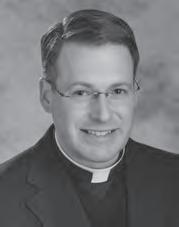
The days schedule will include a rally in the Capitol rotunda, educational opportunities, and meetings with state representatives. Participants will hear from a variety of inspiring speakers and have the opportunity to connect with many of the leading pro-life organizations from around the state.
It is now more important than ever to UNITE and make the pro-life message heard in Minnesota. Join Bishop Chad Zielinski and the other Minnesota Catholic bishops for this important pro-life event.
Bussing provided
The Diocese of New Ulm will be providing bussing to the United for Life event. Schedules for the bus routes, as well as a link to register to reserve a seat on the bus will be posted on dnu.org as soon as details are finalized. Stay tuned to secure your seat.
Additional opportunities
It is our duty as faithful citizens
to promote a consistent ethic of life. You can begin to do so by participating in any of these great opportunities at the Minnesota State Capitol this session to pray for and meet with your legislators.
Capitol Thursdays - second and fourth Thursday of each month from 10-11:30 a.m.
Learn to advocate for policies that pursue a consistent ethic of life, tour the Minnesota State Capitol, and meet with your legislators.
Adoration - offered first Fridays from January to May, any time from 9 a.m. to 4 p.m. at the Minnesota State Capitol in the Governor’s dining room.
Pray for our legislators and state to promote the common good. Note, in April, adoration will take place on the 14th due to Good Friday.
Visit MNCatholic.org/events for details on each of these events.

education The Prairie Catholic l Page 10 l January/February 2023
Join Bishop Zielinski at pro-life advocacy day at State Capitol
Litchfield woman’s childrens book inspired by young grandson
 by Kathryn Ballalatak Prairie Catholic correspondent
by Kathryn Ballalatak Prairie Catholic correspondent

LITCHFIELD – “A Very Special, Wonderful Boy,” written by Deborah Dufresne, a longtime resident of Litchfield and parishioner at the Church of St. Philip, can be boiled down to one primary message: It’s all about being kind.
Self-published through Christian Faith Publishing and released on May 3, 2022, Dufresne’s children’s book follows a young, caring boy named Ian who “has a heart that is two sizes too big” and has a hard time learning one of life’s most frustrating lessons: Life’s not fair.
Through the story, readers grow with Ian as he learns how to protect his big heart while continuing to treat others with kindness, speak the truth, and “inspire average people to be better people.”
The concept of the book
This heartfelt story was inspired by Dufresne’s grandson, Ian who exhibited a “big heart” and a caring, loving spirit. In 2015, she decided to write a book about his “big heart” and gave it to the thenseven-year-old as a Christmas present.
“The ideas and the words [for the book], I must say, really felt like a gift of the Holy Spirit,” says Dufresne. “It was almost too big of an idea. And I didn’t think it came from me.”
She also drew inspiration from two quotes, one from Gandhi: “You must be the change you wish to see in the world.” And the other is from St. Francis of Assisi: “Preach the Gospel at all times, if necessary, use words.”
“I love that [last] quote,” says Dufresne. “It’s all about being kind. That’s the bottom line.”
Book turned mission
When she wrote her book, Dufresne was a Minnesota Reading Corps preschool literacy tutor at a Head Start classroom, which allowed her to share her book with the kids and teachers there and read it out loud to her young grandson's class. “I got so much good feedback that it made me think that I might have something here to share,” says Dufresne.
She eventually sent her manuscript to a few publishing houses. “I mostly got compliments and rejections,” says Dufresne. “But some even asked for permission to use it in their curriculum. That
was flattering, and I wanted to get the word out, so I said, ‘Sure, go ahead.’”
It wasn’t until COVID-19 hit –and with it, a sudden halt in her literacy tutor role – that Dufresne had the time to consider selfpublishing seriously. But it was when she heard celebrity Whoopi Goldberg on TV share her list of suggested books that Dufresne decided to make publishing happen. “She held up a self-
published children’s book and said, ‘I really encourage you to look at self-publishing.’ Well, she encouraged me, and that’s how I found Christian Faith Publishing house.”
Working with her publisher, Dufresne chose something simple regarding the illustrations hoping children would see themselves in the story. She and her husband Steve’s goal is to make the book available to every Catholic grade
school in Minnesota, and they have nearly accomplished that goal as only the Archdiocese of St. Paul and Minneapolis remains. Dufresne’s granddaughter, who will be confirmed this year, will help address and mail the last copies as part of her community service. “It’s kind of becoming a family project,” Dufresne chuckles.
The real-life Ian is now a 14-yearold high school student, and his impact on his grandma’s story is still felt by him today. “I was young [when I received the book], so I don't remember it very well, but I know I was happy,” says Ian. Now, as a teenager, he says, “I just like that my grandma was willing to do this for me. It means a lot.”
Dufresne sent a copy of her book to New Ulm’s new bishop Chad Zielinski as a welcome-toMinnesota gift. To her surprise, he sent a response. “The last line read: ‘The mission is magnificent.’ So, if I get kudos like that, I better keep going,” laughs Dufresne.
“A Very Special, Wonderful Boy” can be purchased through Barnes & Noble and Amazon, or from Dufresne directly: stdufresne49@ yahoo.com. All proceeds go back to Dufresne's mission and the cost of production.
COR Night draws large number of youth - Bishop Zielinski evening keynote
by Kevin Losleben
OLIVIA – Over 160 youth and their adult chaperones gathered on Sunday, Dec. 11, 2022, at St. Aloysius in Olivia for the diocesan-sponsored COR Night. They came for many reasons, but inarguably the biggest draw was to hear their newly appointed bishop speak.
After some youthful games and a time for praise featuring live contemporary Christian music, Bishop Chad Zielinski took the stage. His talk was built on a theme he developed while bishop of Fairbanks, Alaska, namely that we are to be “protectors of the Incarnation” like St. Joseph in the way we live our American citizenship as faithful Catholics. Just as St. Joseph had to defend the Infant Jesus from King Herod’s murderous jealousy, so too, Bishop Zielinski said that “The threat of Herod that we face today comes in the form of government systems and leaders
throughout the world, and sadly in our nation, who over the past years have advanced the killing of the unborn.”
The topic is poignantly relevant to youth today. Faced with a barrage of confusing and outright evil messages regarding abortion, gender, and their own selfworth, the youth need to hear a clear voice proclaim the truth of “Christian anthropology,” which, as the bishop articulated, “means that we are created in the image and likeness of God, how God created us. . . He got it right! You don’t need to change that.”
Although we all need to defend the image of God in each and every human being, the bishop emphasized that a great deal of the burden of ensuring this message is proclaimed falls to himself as a bishop. “We hear from the Prophet Jeremiah – and this comes to me, so I’m speaking about myself here,” – ‘Woe to the shepherds who mislead and scatter the flock
of my pasture, says the Lord’…”
The bishop added, “As a successor of the Apostle[s], I am called to shepherd the faithful of the Diocese of New Ulm. I have to seriously ponder my culpability for not responding, full-throated, as a prophet, as a protector of the Incarnation.”
Ask the bishop!
Following the bishop’s talk, the youth were encouraged to discuss his main points and submit questions. Questions varied from lighthearted to serious.
Many youth were interested in the bishop’s time in Alaska. When asked what his favorite animal to hunt in Alaska is, he answered: moose. “I think I’ve shot five moose up there.”
Eli from Morgan asked him about his favorite experiences in Alaska. Bishop Zielinski said that he had many, but he recounted “getting in a helicopter and flying to the island of Little Diomede which is
2.4 miles from Russia.” He also recalled everyday experiences in Alaska that to us would seem exotic, such as “going to a potluck after [celebrating] Confirmation and you’re eating walrus and seal and muskox and whale and all kinds of strange things.” As an avid outdoorsman, he enjoyed “catching big salmon, monster pike on a fly rod, and harvesting moose, ducks and geese.”
On a more serious note, one youth asked, “What encouraged you to be a priest?”
Bishop Zielinski responded that when he was in high school, his parish priest was the vocation director. “Every time we would go out the door, Father would look at me, and he would say, ‘Have you ever thought about becoming a priest?’”
Annoyed, the young Chad Zielinski “would get up out of the pew” after Mass, figure out which


door the priest was at, and “would go out the opposite door.”
Once in the military, people continued to encourage him to become a priest, and he began taking it more seriously. “Some of these young men – I can guarantee you – in this room right now,” the bishop said aiming his attention at the boys in the room, “God is going to call some of you to become priests. Open your heart, open your mind, open the door, let him speak to you,” he said.
The next COR Night will be Sunday, Feb. 26 in Olivia. Visit www.dnu.org/youth for details.
The Prairie Catholic l Page 11 l January/February 2023 around the diocese
Self-published author Deborah Dufresne of Litchfield stands beside her now 14-year-old grandson Ian who the main character in her book is named after. (Photo submitted)
Kevin Losleben is director of Youth and Young Adult Ministry for the Diocese of New Ulm, klosleben@dnu. org, 507-233-5327.
WASHINGTON – On December 29, 2022, the U.S. Department of Health and Human Services issued proposed revisions to a regulation that interprets various laws that protect the exercise of religious beliefs and moral convictions in healthcare, commonly called the “Conscience Rule.” In response, Cardinal Timothy M. Dolan of New York, chairman of the U.S. Conference of Catholic Bishops’ Committee for Religious Liberty, issued the following statement:
“While the proposed revision to the Conscience Rule will need time to digest, I am troubled by
its implications that desire for abortion and other procedures can override rights of conscience. Pope Francis has called conscientious objection ‘the ultimate responsibility of healthcare professionals,’ one that ‘should never be negotiated.’ Strong majorities of Americans agree – in a USCCB study this year, 60% of registered voters said that a doctor should not be pressured or penalized by the government to perform abortions or gender transition procedures that go against his or her conscience.

“It is crucial that the federal government broadly interpret
and robustly enforce our nation’s laws protecting this fundamental right of conscience and of health workers to do no harm.”
WASHINGTON, DC – President Joe Biden issued a memorandum on Sunday, Jan. 22, 2023, the 50th anniversary of Roe v. Wade, directing federal agencies to support wider access to abortion pills.
His memo comes after the Food and Drug Administration (FDA) changed its policy on Jan. 3 to allow any patient with a prescription to obtain mifepristone from their local retail pharmacy.
Mifepristone is the first of the two pills used in a chemical abortion. The drug works by cutting off nutrients necessary for a fetus to continue developing. Mifepristone is commonly taken with a second drug, misoprostol, which is ingested 24 to 48 hours later and induces contractions that expel the dead unborn child.
Until January, FDA policy only allowed certified doctors, clinics, and some mail-order pharmacies to dispense mifepristone.
On Jan. 6, the United States Catholic bishops condemned the

Biden administration’s decision to allow pharmacies to distribute abortion drugs:
“The Catholic Church is consistent in its teaching on upholding the dignity of all life, and that must include care for both women and their children. We decry the continuing push for the destruction of innocent human lives and the loosening of vital safety standards for vulnerable women. This week’s action by the FDA not only advances the obvious tragedy of taking the lives of the preborn, but is also harmful to women in need.
“The rate of serious complications after chemical abortion is
considerably higher than after surgical abortion. Overturning the safety protocols around abortioncausing drugs to effectively make them available on demand at pharmacies, requiring no in-person medical supervision, facilitates the isolation of critically vulnerable pregnant women, and invites more risk, pain, and trauma. It may also result in new violations of conscience for pharmacy workers who cannot dispense such drugs. The FDA should protect the life and health of both mothers and children, not loosen safety standards under industry or political pressures. We call on the Administration to correct its policy priorities and stand with mothers in need. They deserve better.”
Sponsored by the diocesan Office of Youth and Young Adult Ministry
























 By Carlos and Shelly Mendiola,
By Carlos and Shelly Mendiola,

 By Dale Bailey, parent New Ulm Area Catholic Schools
By Dale Bailey, parent New Ulm Area Catholic Schools




















 by Kathryn Ballalatak Prairie Catholic correspondent
by Kathryn Ballalatak Prairie Catholic correspondent



